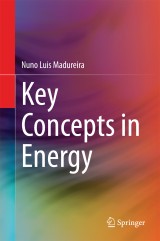Details

Key Concepts in Energy
|
96,29 € |
|
| Verlag: | Springer |
| Format: | |
| Veröffentl.: | 08.07.2014 |
| ISBN/EAN: | 9783319049786 |
| Sprache: | englisch |
Dieses eBook enthält ein Wasserzeichen.
Beschreibungen
<p>Organized around eight fundamental ideas, Key concepts in energy history explores the discoveries, technologies and new paradigms in the field of energy, and how they have changed the course of history. Complex technical concepts such as the “rebound effect”, “technological hybridization”, “marginal cost pricing” are explained in clear terms and a balanced and concise account of t energy sources in the XIX and XX century such as wood, coal, oil, hydroelectricity and nuclear energy is provided.</p><p>Key concepts in energy considers the process of energy-substitutions and analyzes it as a process of complementary usages, hybridization and technological mixes. The ex-post view tends to focus on replacement from among alternative energy-technologies and is basically innovation-centric. This means that little attention has been given to factors such as the windows of opportunities created by governments, inventors and entrepreneurs.</p><p>This book highlights how key energy concepts surfaced, tracing their evolution throughout history. It encompasses four economic concepts (rebound effect, energy intensity, marginal cost pricing and levelized cost accounting) and four technological-engineering concepts (primary/final energy, technological hybridization, last gasp and probable oil reserves). The main benefit from reading the book is a cross disciplinary overview of energy fundamentals in a short and focused reading.</p>
<p>1.- Primary/Secondary/Final Energy 2.- The Rebound Effect 3.- Technological Hybridization 4.- The Last Gasp 5.- Probable Oil Reserves 6.- Energy Intesnity 7.- Marginal Cost 8.- Levelized Cost Accounting 9.- Final Remarks.</p>
Nuno Luis Madureira is Professor at Lisbon University Institute. With a formative background in history he became furthermore interested in economics, environmental and engineering sciences developing a cross-disciplinary approach to global energy issues. The book “Key concepts in energy history” results from several years of research in European archives but also from the experience and archival investigation pursued as visiting scholar at Harvard University and Berkeley University. Since 2006 the author has also carried on several assessments for the European Science Foundation.
<p>Organized around eight fundamental ideas, Key concepts in energy history explores the discoveries, technologies and new paradigms in the field of energy, and how they have changed the course of history. Complex technical concepts such as the “rebound effect”, “technological hybridization”, “marginal cost pricing” are explained in clear terms and a balanced and concise account of t energy sources in the XIX and XX century such as wood, coal, oil, hydroelectricity and nuclear energy is provided. <br>Key concepts in energy considers the process of energy-substitutions and analyzes it as a process of complementary usages, hybridization and technological mixes. The ex-post view tends to focus on replacement from among alternative energy-technologies and is basically innovation-centric. This means that little attention has been given to factors such as the windows of opportunities created by governments, inventors and entrepreneurs.</p><p>This book highlights how key energy concepts surfaced, tracing their evolution throughout history. It encompasses four economic concepts (rebound effect, energy intensity, marginal cost pricing and levelized cost accounting) and four technological-engineering concepts (primary/final energy, technological hybridization, last gasp and probable oil reserves). The main benefit from reading the book is a cross disciplinary overview of energy fundamentals in a short and focused reading.</p>
<p>Highlights how key energy concepts surfaced, tracing their evolution throughout history to encompasses four economic concepts and four technological-engineering concepts developed through their history to conclude with current economic and environmental sciences</p><p>Considers the process of energy-substitutions through complementary usages, hybridization and technological mixes</p><p>Combines a conceptual approach with key theoretical concepts from engineering, geological and economic sciences providing cross disciplinary overview of energy fundamentals in a short and focused reading</p><p>Includes supplementary material: sn.pub/extras</p>

















